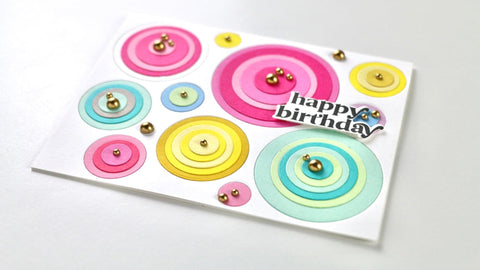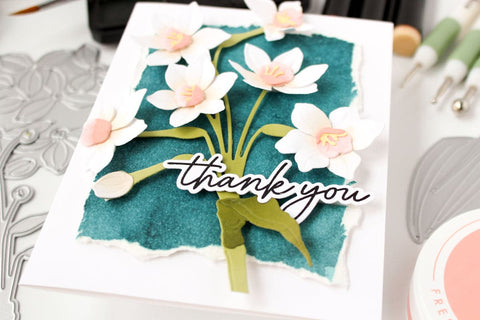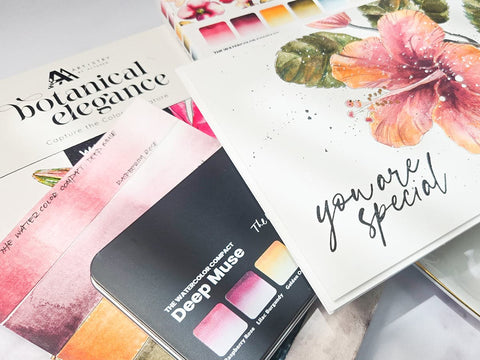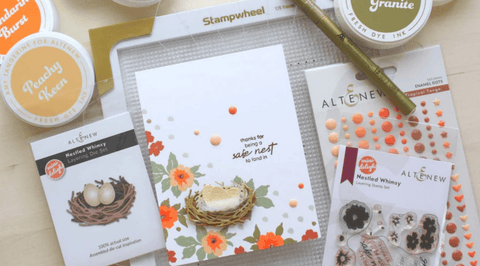5 Simple Watercoloring Techniques for Beginners
Last Updated: September 28, 2021

Watercoloring can be a daunting task, especially for beginners, but it need not be that way. It may take a little practice to get the hang of it, but you’ll get it in no time. Watercoloring can be super simple; you just need to let go and let it flow! There are so many different watercoloring techniques that you can try, and we are sure you will find one you love.
Fun fact! Did you know that watercoloring has been around since the 1700s? Artists from around the world still use this art form today. We have comprised a list of 5 amazingly simple watercolor techniques that you can do today to create your very own piece of art. So dust off your watercolor supplies and give some of these techniques a try!
1. Scribble, Water, and Dry

Link to Scribbling Video: https://youtu.be/W8Wrv09vmfUThis watercoloring technique is super simple; you’ll wonder why you’ve never tried it before! It works best on heat-embossed images, but a black outline works just as well. Here’s a quick step-by-step on how to do this technique.
- First, stamp your image (emboss it if you’d like) and scribble some color onto it. You don't need to worry about coloring the whole image since a little bit of watercolor marker goes a long way.
- Once you are happy with it, simply spritz some clean water on the image. The water will react with the watercolor marker and make the ink move.
- Then leave to dry.
- Die-cut the image, so you don't need to worry about the ink spreading outside the stamped image.
- Add more water for a lighter color and less water if you want it darker.
- To add even more dimension to your color, try mixing the colors before spritzing with water.

It's as easy as that! These beautiful watercolor images can be added to any of your handmade projects. You can also try this technique on die-cut letters and sentiments for a customized look. The beauty of this simple watercoloring technique is it will give you a different and unique look every time.
2. Splatter Watercolor

Splattering is another great watercolor for beginners technique. This technique is a quick and easy way to add a messy watercolor look to your handmade projects. Here’s how to achieve the splatter effect on your watercolor projects.
- Stamp your images onto watercolor cardstock using water-proof ink.
- Wet the watercolor paper by either spraying some water on the watercolor or adding water to the paper using a brush.
- Tip! Adding water behind the paper will help it stick to your work surface and help stop warping when drying.
- Next, use diluted watercolor and splatter it on the paper. You can add as many colors as you like as long as they are close together on the color wheel.
- If you want a more visible splatter, dry the first layer, and add a second layer of splatter for a more dramatic effect.
- You can always use a heat tool to dry the paper faster, but it's always best to let your project air dry as this will minimize warping.
3. No-Line Watercoloring Using Stencils
 Like any art form, watercoloring is the perfect hobby for those who want to unwind and de-stress. Simply grab your watercoloring kit, sit back, relax, and watercolor your stress away! Have you tried watercoloring using stencils? Here’s how!
Like any art form, watercoloring is the perfect hobby for those who want to unwind and de-stress. Simply grab your watercoloring kit, sit back, relax, and watercolor your stress away! Have you tried watercoloring using stencils? Here’s how!- Place your chosen stencil over a piece of watercolor paper and add light color ink to it.
- Choose your ink depending on the color you want to paint it with. Remember, this is just a guide, so the lighter the ink, the better.
- Remove the stencil and then start watercoloring the image.
- Simply color over the stenciled image to create a look that you have hand-painted it yourself.

You can also check out this quick and easy video tutorial showing how to do this no-line watercoloring technique.
4. Ink Smooshing
If you’re looking for the easiest watercolor for beginners technique, you’ve found it! Ink smooshing is so easy; even young kids can do it! This enjoyable watercolor technique is perfect for days when you want to create something in less than 10 minutes. Want to try this technique? Read on or check out this how-to watercolor video tutorial.
- First, stamp your chosen images onto a piece of watercolor paper using waterproof ink.
- Next, add some watercolor to a palette and mist it with a little water.
- Then, take your stamped piece and place this, with the image side down, onto the watercolor pigment.
- Repeat the last step until you are satisfied with the look.
- For an even greater color dimension, leave to dry before smooshing again.
- Repeat the steps but with slightly different colors for more variation.

5. Stippling Texture on Petals

Another fun and simple watercoloring technique for beginners is stippling! This technique is especially perfect for adding texture to stamped images, such as flowers and foliage. Check out the instructions below on how to do the stippling technique or watch the video tutorial here.
- Stamp your chosen images onto watercolor cardstock using waterproof ink. Altenew’s Obsidian Pigment Ink is perfect for this.
- Add clear embossing powder to the images to help keep the stamped areas separate.
- To start, color the area using water and a little watercolor to create a base. This will make it easier for the watercolor pigment to move on its own.
- To create shadow and shade, drop some more watercolor into where the image would be the darkest. For example, at the base of a petal/leaf or where an image overlaps the other.
- Leave this layer of watercolor to dry before adding stipples or dots of watercolor to the darker and more shaded parts of the image.
 These 5 simple watercoloring techniques are beginner-friendly, fun, and easy. Try it in your free time for some much-needed relaxation and de-stressing, or with your family and friends! No experience necessary to try these watercolor for beginners ideas. What are you waiting for? Grab your watercoloring kit and try these techniques today!
These 5 simple watercoloring techniques are beginner-friendly, fun, and easy. Try it in your free time for some much-needed relaxation and de-stressing, or with your family and friends! No experience necessary to try these watercolor for beginners ideas. What are you waiting for? Grab your watercoloring kit and try these techniques today!
1 comment
In This Article
More Crafty Reads & Inspirations
-

Starting 2026 With a Clean Slate and Using Up Leftovers
-

January 2026 Inspiration Challenge
-

Simple Tips To Bring Your Die Cut Florals To Life - A Touch of Sparkle With Carissa Wiley
-

3 Secrets for No-Outline Watercoloring: The Art of the Disappearing Line | Perfect Pairings with Jaycee
-

Card Ideas that Symbolize New Beginnings
















Hi, I’ve been trying to practice watercoloring techniques for card making and have been pretty frustrated so far. This helps explain some crucial steps that I wasn’t aware of and prior videos I’ve seen didn’t give the basic facts on successful methods to have better results. Thanks for this complete explanation!